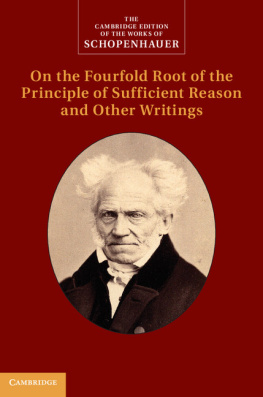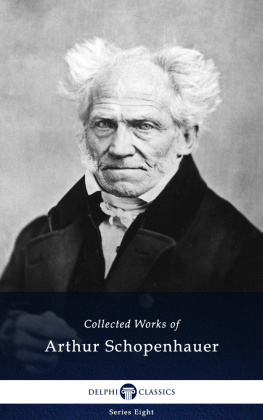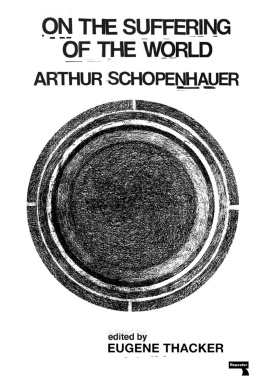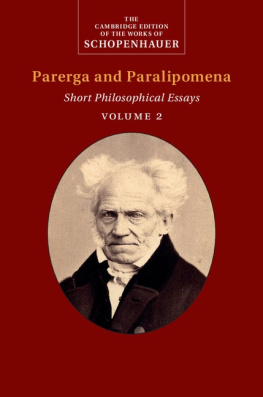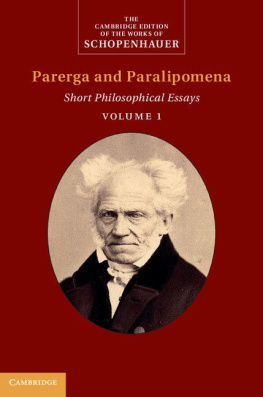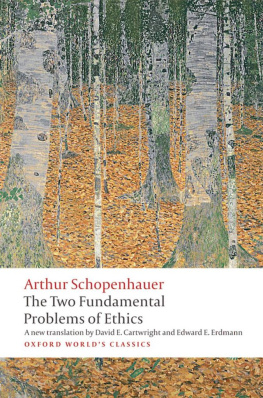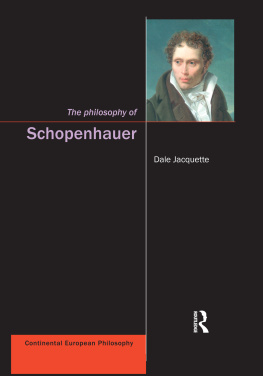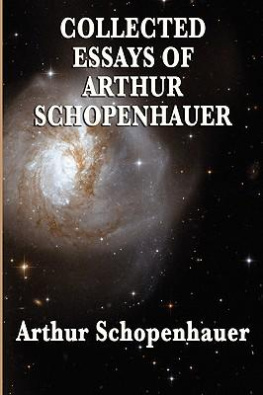Arthur Schopenhauer - On the Fourfold Root of the Principle of Sufficient Reason and Other Writings
Here you can read online Arthur Schopenhauer - On the Fourfold Root of the Principle of Sufficient Reason and Other Writings full text of the book (entire story) in english for free. Download pdf and epub, get meaning, cover and reviews about this ebook. year: 2015, publisher: Cambridge University Press, genre: Science. Description of the work, (preface) as well as reviews are available. Best literature library LitArk.com created for fans of good reading and offers a wide selection of genres:
Romance novel
Science fiction
Adventure
Detective
Science
History
Home and family
Prose
Art
Politics
Computer
Non-fiction
Religion
Business
Children
Humor
Choose a favorite category and find really read worthwhile books. Enjoy immersion in the world of imagination, feel the emotions of the characters or learn something new for yourself, make an fascinating discovery.
- Book:On the Fourfold Root of the Principle of Sufficient Reason and Other Writings
- Author:
- Publisher:Cambridge University Press
- Genre:
- Year:2015
- Rating:3 / 5
- Favourites:Add to favourites
- Your mark:
- 60
- 1
- 2
- 3
- 4
- 5
On the Fourfold Root of the Principle of Sufficient Reason and Other Writings: summary, description and annotation
We offer to read an annotation, description, summary or preface (depends on what the author of the book "On the Fourfold Root of the Principle of Sufficient Reason and Other Writings" wrote himself). If you haven't found the necessary information about the book — write in the comments, we will try to find it.
Arthur Schopenhauer: author's other books
Who wrote On the Fourfold Root of the Principle of Sufficient Reason and Other Writings? Find out the surname, the name of the author of the book and a list of all author's works by series.
On the Fourfold Root of the Principle of Sufficient Reason and Other Writings — read online for free the complete book (whole text) full work
Below is the text of the book, divided by pages. System saving the place of the last page read, allows you to conveniently read the book "On the Fourfold Root of the Principle of Sufficient Reason and Other Writings" online for free, without having to search again every time where you left off. Put a bookmark, and you can go to the page where you finished reading at any time.
Font size:
Interval:
Bookmark:

The purpose of the Cambridge Edition of the Works of Schopenhauer is to offer translations of the best modern German editions of Schopenhauer's work in a uniform format suitable for Schopenhauer scholars, together with philosophical introductions and full editorial apparatus.
This volume of new translations unites three shorter works by Arthur Schopenhauer that expand on themes from his book The World as Will and Representation . In On the Fourfold Root he takes the principle of sufficient reason, which states that nothing is without a reason why it is, and shows how it covers different forms of explanation or ground that previous philosophers have tended to confuse. Schopenhauer regarded this study, which he first wrote as his doctoral dissertation, as an essential preliminary to The World as Will and Representation . On Will in Nature examines contemporary scientific findings in search of corroboration of his thesis that processes in nature are all a species of striving towards ends; and On Vision and Colours defends an anti-Newtonian account of colour perception influenced by Goethe's famous colour theory. This is the first English edition to provide extensive editorial notes on the different published versions of these works.
David E. Cartwright is a Professor of Philosophy and Religious Studies and the chair of the Department of Philosophy and Religious Studies at the University of Wisconsin--Whitewater. He has numerous publications on nineteenth-century German philosophy and has edited and translated a number of Schopenhauer's books, most recently with Edward E. Erdmann, The Two Fundamental Problems of Ethics (2010); he is the author of Schopenhauer: A Biography (2010).
Edward E. Erdmann is an emeritus faculty member of the University of Wisconsin--Whitewater with a scholarly background in classical and early modern rhetorical theory. He writes regularly on subjects in agriculture and has edited German translations of textbooks and scientific reports on organic agriculture.
Christopher Janaway is Professor of Philosophy at the University of Southampton. He has published widely on nineteenth-century German philosophy, including Self and World in Schopenhauer's Philosophy (1989), The Cambridge Companion to Schopenhauer (1999), Schopenhauer: A Very Short Introduction (2002), and Beyond Selflessness: Reading Nietzsche's Genealogy (2007). He is General Editor of The Cambridge Edition of the Works of Schopenhauer, in which he has translated The Two Fundamental Problems of Ethics and co-translated The World as Will and Representation, Volume 1 .
For a list of titles published in the series, please see .

Schopenhauer is one of the great original writers of the nineteenth century, and a unique voice in the history of thought. His central concept of the will leads him to regard human beings as striving irrationally and suffering in a world that has no purpose, a condition redeemed by the elevation of aesthetic consciousness and finally overcome by the will's self-denial and a mystical vision of the self as one with the world as a whole. He is in some ways the most progressive post-Kantian, an atheist with profound ideas about the human essence and the meaning of existence which point forward to Nietzsche, Freud, and existentialism. He was also the first major Western thinker to seek a synthesis with Eastern thought. Yet at the same time he undertakes an ambitious global metaphysics of a conservative, more or less pre-Kantian kind, and is driven by a Platonic vision of escape from empirical reality into a realm of higher knowledge.
Schopenhauer was born in 1788, and by 1809 had gone against his family's expectations of a career as a merchant and embarked on a university career. He completed his doctoral dissertation On the Fourfold Root of the Principle of Sufficient Reason in 1813, then spent several years in intensive preparation of what became the major work of his life, The World as Will and Representation , which was published at the end of 1818, with 1819 on the title page. Shortly afterwards his academic career suffered a setback when his only attempt at a lecture course ended in failure. Thereafter Schopenhauer adopted a stance of intellectual self-sufficiency and antagonism towards university philosophy, for which he was repaid by a singular lack of reaction to his writings. In 1836 he published On Will in Nature , an attempt to corroborate his metaphysics with findings from the sciences, and in 1841 two self-standing essays on free will and moral philosophy, entitled The Two Fundamental Problems of Ethics . A large supplementary second volume to The World as Will and Representation appeared in 1844, accompanied by a revised version of the original which now appeared as Volume 1; then in 1851 another two-volume work, Parerga and Paralipomena , a collection of essays and observations. Only in the 1850s did serious interest in Schopenhauer's philosophy begin, with a favourable review appearing in an English journal and a few European universities offering courses on his work. In this final decade before his death in 1860 he published a third edition of The World as Will and Representation and a second edition of The Two Fundamental Problems of Ethics . After Schopenhauer's death his follower Julius Frauenstdt produced the first six-volume edition of his works in 1873, providing the basis for many subsequent German editions up to the Smtliche Werke edited by Arthur Hbscher, which we use as the basis for our translations in the present edition.
Font size:
Interval:
Bookmark:
Similar books «On the Fourfold Root of the Principle of Sufficient Reason and Other Writings»
Look at similar books to On the Fourfold Root of the Principle of Sufficient Reason and Other Writings. We have selected literature similar in name and meaning in the hope of providing readers with more options to find new, interesting, not yet read works.
Discussion, reviews of the book On the Fourfold Root of the Principle of Sufficient Reason and Other Writings and just readers' own opinions. Leave your comments, write what you think about the work, its meaning or the main characters. Specify what exactly you liked and what you didn't like, and why you think so.

